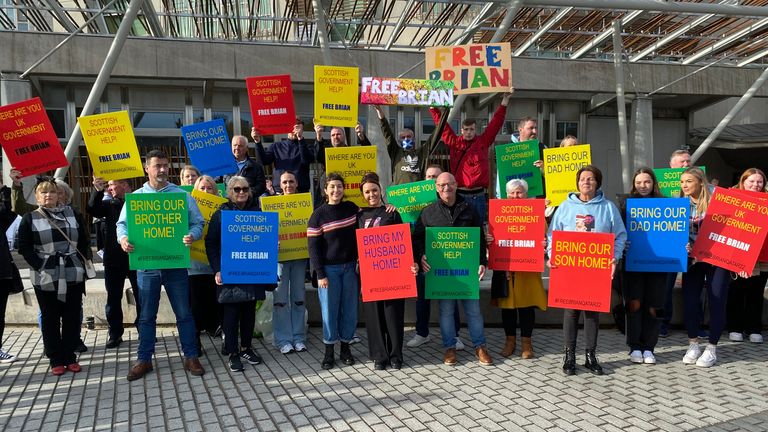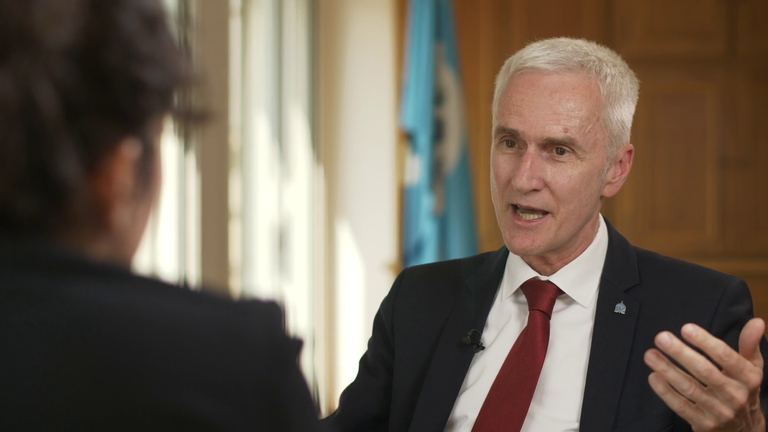“I am being held at the airport. Please don’t worry too much,” the message read. “I think I will be okay. But who knows?” Kimberley Glendinning won’t forget the moment she read those words. “My heart actually missed a beat,” she says, her voice quavering.
In September 2022, Kimberley’s husband, Brian, was on his way to a job in Iraq. He’d worked in the oil industry for years, often abroad. She was used to it.
So when he left their home in Kincardine, Scotland, she was expecting him to check in during his stopover in Dubai, and again on arrival in Basra. His message from Dubai was cheerful. But when he landed in Basra – everything changed. Brian had been detained because of an Interpol Red Notice.
“It was horrible,” Kimberley says.
Brian, who is 44, has three children with Kimberley. Nobody knew when or how he would be released. He was moved from Basra to a prison in the capital Baghdad where he was able to convince the prison guards to let him call home occasionally, but his family never knew when the phone would ring.
The Red Notice was uploaded to Interpol by Qatar, and dates back about five years to when Brian was living and working there as an oil engineer. He had taken out a bank loan and was working and paying it off until he became ill, left Qatar and lost his job.
Back in the UK, Brian says he contacted the bank to try and figure out a repayment plan. But he had paid most of it off and figured he would settle it eventually. In the meantime, the bank took him to court and that court issued a warrant for his arrest, and made a request for a Red Notice through Interpol.
Brian’s prison conditions in Baghdad, where he spent the majority of his time, were poor. The toilet was an open drain in the corner of a cell which he shared with 42 people, some of them hardened criminals. He had to pay some of them for protection.
Click to subscribe to Dirty Work: The Misuse of Interpol Red Notices
“In his words, they were al Qaeda terrorists. People who have murdered their own father,” says John Glendinning, Brian’s brother who dropped everything to help coordinate his release. “And Brian’s in for about the last £4-5,000 of a loan. It doesn’t make sense.”
Kimberley was equally stunned. Her husband is a good guy, she says, and has never been in trouble before. Her mind kept racing with dark thoughts about what he might be going through. She was afraid that even if she did get her husband back – he might never be the same again.
“Brian said to me that there’s things that he’s seen in that cell… he never thought he’d see in his lifetime.”
Representatives of the Qatari government and the national bank were approached for comment and have not responded.
Lives can be ruined
Most people don’t know that you can be locked up in a country you’ve never been to for a small amount of debt you owe in a country you don’t live in anymore. Most people with a Red Notice have no idea until they try to cross a border. But Brian’s story isn’t as unusual as it sounds.
About 20,000 Interpol notices are issued each year – acting as digital wanted posters which help police forces fight cross-border crime, and find fugitives. The notices are uploaded to a central database accessible to police in 195 countries.
When the notice system works, it helps capture people wanted for the most serious crimes: murder, drug trafficking, sexual exploitation, terrorism, money laundering. We don’t know exactly how many people are actually arrested on these notices each year, but data from 2016 suggests that the figure is in the low thousands.
When the system breaks down, it is vulnerable to abuse by authoritarian governments tracking dissidents, business people seeking leverage, powerful people settling scores, and even banks collecting debt.
According to the available data these are a small minority of all Red Notices.
But for each person the consequences can be devastating: families separated, businesses fallen apart, freedoms taken away.
In short, lives can be ruined.
The Uyghur activist
Zeynure Hasan hasn’t seen her husband, Idris, a Uyghur activist who lived in exile in Istanbul, for two years. The couple’s three children are growing up without their father.
“I am angry,” Zeynure told us. “My children ask every day: where is my dad?”
Idris is a computer scientist who spread the word about China’s treatment of his people. Human rights groups have called China’s treatment of Uyghurs a genocide. The Chinese authorities accused Idris of what they call “terrorism”.
He was arrested at an airport in Morocco, after China requested a Red Notice through Interpol. Although Interpol quickly cancelled the notice, admitting that it was in breach of its own rules against political, religious and racial persecution, it was too late. Idris was already in a Moroccan prison. Despite claiming asylum, he is still in prison and fighting against extradition to China.
“If the Moroccan government send me to China, this would be equal to death for me,” Idris told us on the phone from prison, where he’s in solitary confinement. “Maybe I am forever in prison. I cannot see my children and my family – forever.”
Authorities in China and Morocco were approached for comment.
Talking to Interpol
Interpol is a membership organisation for the world’s police forces. It was founded in the wake of the First World War, when the world powers came together to combat cross-border crime. As global travel has become easier, and technology more sophisticated, fighting international crime is harder than ever. Interpol will celebrate its 100th anniversary later this year, and the challenges it faces have never been greater.
“If a murderer is on the run, time matters. It’s a time-sensitive thing. Somebody can jump on a plane in a few hours, be somewhere else and commit the next crime. So we need to act fast,” says Interpol’s Secretary General, Jurgen Stock.
The Red Notice system is the cornerstone of Interpol’s toolkit. A police force in one country can issue a Red Notice request to Interpol for a fugitive. Interpol then pins that Red Notice to an internal message board visible to police around the world. Each country then acts on the information according to their own protocols. These can vary significantly. Some countries don’t generally act on them, others treat them as if they were arrest warrants.
Despite Interpol’s own guidelines saying that notices can’t be actioned if they have political, ethnic, military or religious intent, it’s clear that some of this nature are still getting through.
Stock took the helm in 2014 and will leave office next year. To combat abuses of Red Notices, he created a new task force to check them prior to circulation and beefed up the review council that investigates the worst cases. Stock sees his Red Notice reforms as defining his legacy.
But cases are still slipping through the net, and human rights lawyers and advocates claim the system is open to error and abuse.
In an interview at Interpol’s French headquarters, Stock described the Red Notice system as “very robust” but admitted it can break down, decrying every abuse as “one case too many”.
The organisation has improved its transparency under Jurgen Stock, but it is difficult to draw conclusions about the success of his reforms within the notice system from the available data.
The Secretary General isn’t willing to be drawn on the specifics of any individual cases, and won’t name the countries with the worst track records. Instead he points to the challenge of ensuring cooperation between countries with very different legal systems, who are sometimes locked in thorny diplomatic relations, and occasionally even at war with each other.
He also defends the Red Notice system as a whole, for its “unique capability” for catching the world’s most wanted international fugitives.
“The percentage of international-related organised crime and terrorism is increasing all around the world – that makes this a mechanism only Interpol can provide.”
‘I’ve lost my way’
Interpol’s limited public data shows that hundreds of people apply each year to have a Red Notice removed after encountering problems at international borders. In most of those cases, the notices are found to be non-compliant with Interpol’s rules. For example, in 2021, about 300 non-compliant notices were issued out of a total 24,000. A further 1,400 were weeded out before being published.
Experts like Ted Bromund, an Interpol historian, maintain that this figure only represents the tip of the iceberg. “If you see a cockroach on the floor of your kitchen and you stamp on it, what are the odds that there are no more cockroaches under the fridge, behind the range or in the walls?” he said.
Unlike many others, Brian’s nightmare did eventually end. He spent nine weeks in prison before striking a deal with the bank to get them to drop the notice. He had to pay more than £30,000, a sum far larger than the original debt. But he had a supportive family and assistance from the British government.
There are very few countries around the world where a relatively small amount of unpaid bank debt would result in imprisonment. But Interpol, inadvertently, provides the tools for countries to “export their justice system” abroad, according to Radha Sterling, an advocate who has helped the Glendinning family navigate his detention.
“Interpol is their bypass, it allows them to export their justice worldwide at the click of a button,” she told us.
Radha runs Detained in Dubai, an organisation that advocates for people detained abroad. Interpol notice cases are an increasing part of her workload. She has seen hundreds of clients‘ lives change beyond recognition.
“A lot of the time the Interpol notice is the punishment,” she says. “It’s a method of state harassment.”
Brian’s return home hasn’t been easy. It’s clear that his experience has shaken him deeply.
“I’ve lost my way,” he said in his first interview since returning from Iraq. “I had a plan, a route that I was going down. I’m wondering how to get back on that path.”
While he has returned to work, he feels a deep sense of dread at the thought of getting on a plane – even for a family holiday. “I’m always thinking, something bad is going to happen to me.”
For Brian, there are enduring questions.
“I just hope one day that I’ll wake up in the morning and I can’t even remember it. I just want it to go away,” he said.
“Will I ever get over it? Will I ever put it behind me?”







